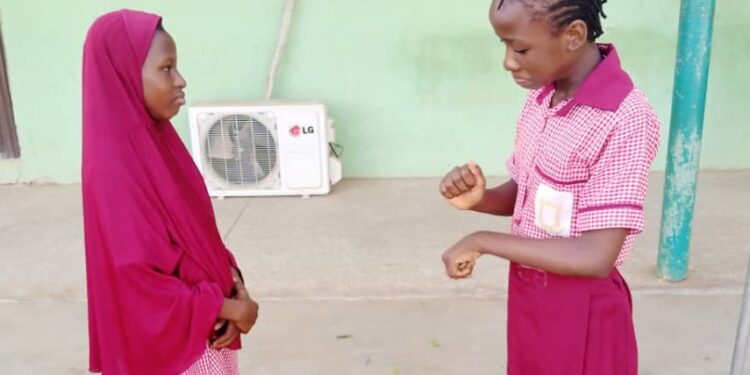As a young girl, I grew up in the bustling city of Lagos, under the protective care of my parents, and away from the harsh realities of life. Whenever, I came across persons with visual impairment, whom we often referred to in the local parlance as “Bambialla” or the “Almajiris”, I thought they were the unfortunate, downtrodden and down on their luck of society.
I saw them as people with no hope for the future, bound to depend on the benevolence of the public, charity organisations, religious groups, and society for the rest of their lives. I always saw them strategically located in the markets, in front of churches, mosques, T-junctions, routes taken by many pedestrians, aided through the traffic and begging for alms for their daily survival.
However, my perception of people with visual impairment changed when, as a pre-teen, I gained admission into one of the unity schools in Nigeria and was faced with the culture shock of seeing visually impaired students in my new school. From there, my perception of visually impaired persons changed for the better. As I began interacting and making friends with some of them, which was not an easy decision, I realised they were not different from me, despite their disability.
I realized they are students like me with hopes, dreams, and aspirations to better themselves and be independent, most of the time, not comfortable with unsolicited help from people and are as polite as possible in such situations. They realized education was power and key to their personal development, and to live an independent life, without being a burden and liability to their friends, families, and society at large.
As I interacted with them, sometimes helping by dictating subject notes to them, and walking occasionally with them around the school compound, I noticed, the first thing they did, when they got to a new environment, is to get familiar as soon as possible with the environments, and adapt quickly and blend with the new environment. As soon as this is done, they start moving around without the aid and support of people and begin to live a life of independence. They are sociable, nice and interesting people to be around. They participated in school activities as much as practicable. I also noticed that they are happy people who are accustomed to getting on with the business of living and survival.
Though they are visually impaired, they were resilient, determined and full of hope for a better future of independence. I discovered some of the visually impaired students were from poor homes but with loving and supportive parents. Most of them were boarders, so on visiting days, their families and their visually impaired friends from Pacelli School for the Blind and Partially Sighted came visiting, and they reciprocated the same gesture by visiting their schoolmates at their various schools. Hereby strengthening the bond and relationship in a supportive community designed to last a lifetime. They had access to scholarships and state-funded bursaries from their state of origin.
As we all left school to face the realities of life from the comfort of our homes, care of our supportive parents and gilded cages, I discovered that the majority of the visually impaired students had gained admission into competitive institutions of higher learning in Nigeria in their pursuit of academic excellence, in various academic disciplines. Some were even in noble professions like law, passing their Bar Exams, and becoming successful lawyers, advocates and voices for the community of persons with disability (PWD).
I, always watch with pride and admiration, whenever I see on Breakfast shows and other TV programs some of my former classmates, though visually impaired, engaging in intellectually stimulating discussions on live TV shows. Despite their disabilities, they are successful in their chosen career and endeavours, married with children and maximizing their potential. I am always proud, to let people around me know, we were schoolmates and I’m proud of their achievements.
Through their lens, I learnt disability is the state of the mind whether physical or mental. It is a perception of how people feel about themselves (self-esteem and image). What they hope to do (can-do spirit) and achieve in life makes a difference. Obstacles and limitations sub-mounted in other to achieve their hopes, dreams and aspirations make the difference between physical and mental disability.
Psychosocial disability in the form of depression, low self-esteem, hopelessness, mental state of defeat, laziness, and lack of vision and motivation are other forms of disabilities that can be overwhelming in life’s journey.
In conclusion, I envisage an enabling society where bursaries, scholarships and other learning aids should be made available for them. Social welfare packages should be one of the major focuses of any well-meaning government to eradicate illiteracy among persons with disabilities.
Access to adequate health care facilities as available in developed countries must be accessible to them as well. The importance of education to empower them cannot be sidelined to live a successful, meaningful and independent life in society as obtainable in developed countries. For them to be favourably positioned to compete economically and politically and have a voice that can be heard in society, like other people living without disability.
Inclusivity of persons with disabilities in all areas of society, because they can contribute meaningfully to the overall development of the country and therefore, should not be marginalized in society.
This article was written by Oluranti Farinloye, MSc Student of Mass Communication (2023/2024), University of Lagos, following the training on Disability Reporting facilitated by Blessing Oladunjoye, Publisher of BONews Service.

